Come, join hands with the leading textile manufacturer from Gujarat, celebrating 32+ years
of legacy and offering worldwide shipping !
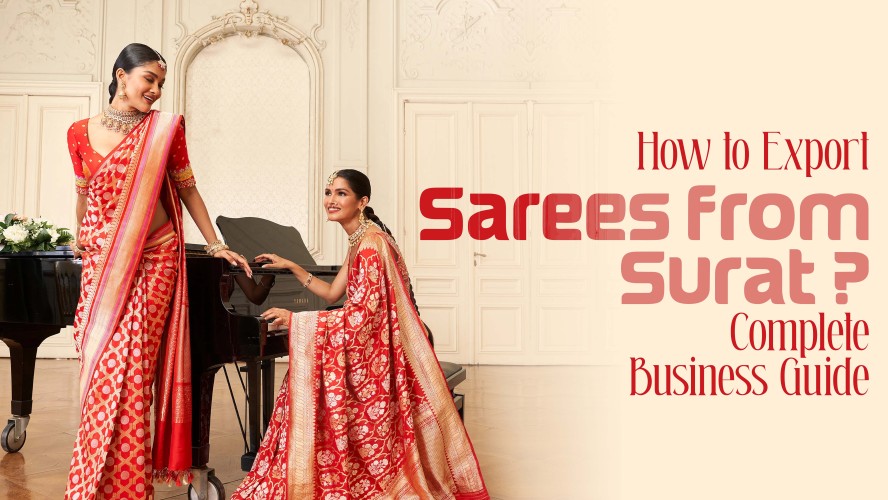
Surat's vibrant textile industry has been the backbone of India's saree manufacturing for decades, with the city producing over 8 million meters of fabric daily. At Ajmera Fashion Limited, we've been helping international clients successfully export sarees from Surat since 2008, and we're sharing our complete blueprint for building a profitable export business.
The numbers speak for themselves - Surat contributes nearly 40% of India's total synthetic fabric production and accounts for approximately 90% of the nation's polyester saree manufacturing. What makes this city truly special for exporters is the perfect combination of scale, skill, and affordability. The local industry employs over 500,000 skilled workers across thousands of manufacturing units, from small workshops to large export houses like Ajmera Fashion.
From our experience helping hundreds of international clients, we've found that Surat offers three unbeatable advantages for saree exporters. First, the production costs are significantly lower than other textile hubs, with factory-direct prices often 30-60% less than what you'd find in Delhi or Mumbai. Second, the design innovation here is unparalleled - our designers at Ajmera Fashion alone create over 200 new saree patterns every month to meet global fashion trends. Third, the entire ecosystem from fabric mills to packaging suppliers is located within a small radius, making logistics remarkably efficient.
Before connecting with suppliers like Ajmera Fashion, it's crucial to research which markets and products offer the best opportunities. Based on our export data, here are the current trends:
The United States market shows strong demand for contemporary fusion designs that blend Indian aesthetics with western styling - think pre-stitched sarees or reversible designs. These typically wholesale between $25-$75 and sell retail for $80-$300. The UK market has shown growing interest in sustainable sarees made with organic cotton or recycled polyester, with particular demand for neutral colors and minimalist designs.
Middle Eastern countries like UAE and Saudi Arabia continue to prefer luxurious embroidered pieces, especially for wedding and festive occasions. These markets are less price-sensitive, with clients often willing to pay premium prices for exquisite zari work and premium fabrics. African markets like Nigeria and South Africa show strong demand for vibrant printed georgette sarees in bold colors and patterns, typically in the $15-$40 wholesale range.
At Ajmera Fashion, we recommend new exporters start with 2-3 product categories rather than trying to serve all markets. For instance, you might focus on affordable daily wear georgette sarees for African markets or premium Dola silk designs for the Middle East. We've found this focused approach helps build expertise and brand recognition faster.
With thousands of manufacturers in Surat, identifying the right suppliers is perhaps the most critical step. From our experience running Ajmera Fashion and working with other manufacturers, here's what to look for:
First, verify the manufacturer's export experience. Genuine export-oriented factories will have an Import-Export Code (IEC) and experience with international documentation. At Ajmera Fashion, we've been exporting to over 15 countries since 2012, and this shows in our understanding of different market requirements.
Second, assess their design capabilities. The best suppliers will have in-house design teams creating new collections regularly. We invest heavily in design at Ajmera Fashion, with 12 full-time designers producing over 200 new patterns monthly across categories like contemporary wear, traditional designs, and fusion styles.
Third, evaluate their production capacity and quality control. Export orders often require strict consistency across hundreds or thousands of pieces. Our facility in Surat's Pandesara industrial area spans 150,000 square feet with dedicated quality control teams conducting six-stage inspections.
When visiting potential suppliers, pay special attention to:
Fabric storage conditions
Printing/embroidery equipment quality
Working conditions for artisans
Sample rooms and design archives
Packaging and labeling capabilities
Exporting textiles from India requires several key documents that Ajmera Fashion helps clients navigate:
The Commercial Invoice is your primary export document, detailing the transaction between exporter and importer. It should include complete product descriptions, harmonized system (HS) codes, quantities, and values. For sarees, the HS code is typically 6204.30.00 or 6211.49.00 depending on fabric and value.
The Packing List accompanies the commercial invoice, specifying contents of each package/carton. This is crucial for customs clearance. We recommend including:
Carton dimensions and weight
Fabric composition percentages
Color/style breakdown
Total number of pieces
Certificate of Origin may be required depending on the destination country and any applicable trade agreements. India has free trade agreements with several countries that can reduce or eliminate duties.
Quality Certificates like Oeko-Tex or ISO certifications add credibility, especially for European and North American markets. Ajmera Fashion maintains multiple international certifications that clients can leverage.
Shipping Documents include the bill of lading (for sea freight) or air waybill, along with insurance certificates. We work with trusted logistics partners to ensure all documentation meets international standards.
After twelve years of exports, we've identified several best practices for shipping sarees from Surat:
For smaller orders (under 50kg), air freight is often most practical despite higher costs. A typical 30kg shipment to the US costs ₹15,000-₹20,000 and arrives in 5-7 days. For larger orders, sea freight becomes economical - a 20ft container holding 15,000-18,000 sarees costs ₹1.5-₹2 lakh to major ports with 30-45 day transit.
Packaging deserves special attention. We recommend:
Individual polybags for each saree
50-100 pieces per carton (depending on fabric)
Moisture-resistant packaging for sea shipments
Clear labeling with style numbers and colors
Insurance is crucial - typically 1-2% of goods value. We've seen too many clients learn this the hard way after damage incidents.
Customs clearance can be simplified by working with experienced freight forwarders. Key considerations include:
Accurate HS code classification
Proper valuation to avoid delays
Understanding destination country regulations
Preparing for possible inspections
At Ajmera Fashion, we've helped hundreds of clients build successful export businesses, and marketing is often the differentiator. Here are proven strategies:
For B2B marketing, focus on:
Creating a professional catalog with high-quality images
Building a simple e-commerce website with bulk order functionality
Listing on B2B platforms like IndiaMart and Alibaba
Attending international trade shows (we can help with samples)
For brand building:
Develop a unique selling proposition (e.g., sustainable sarees, fusion designs)
Create packaging that tells your brand story
Build social proof with testimonials
Consider influencer collaborations in target markets
Pricing strategy should account for:
Product cost (including shipping and duties)
Market positioning (budget vs premium)
Competitor pricing in target countries
Your desired profit margins
As an established exporter with 12+ years of experience, Ajmera Fashion offers several advantages:
Export-Ready Products - All our collections are designed with international markets in mind, meeting global quality and compliance standards.
Complete Documentation Support - From commercial invoices to certificates of origin, we handle all export paperwork.
Customization Options - Private labeling, custom packaging, and exclusive designs available.
Logistics Assistance - We work with trusted freight forwarders to ensure smooth shipping.
Market Insights - Regular updates on international saree trends and demand patterns.
The journey begins with small steps:
Define your target markets and product focus
Connect with Ajmera Fashion for samples and catalogs
Start with a trial order (we recommend 200-500 pieces)
Develop your export documentation
Ship your first order and gather feedback
Scale up based on market response
For new exporters, we're currently offering free export consultancy with orders above ₹5 lakhs, including:
Market selection guidance
Product recommendations
Documentation checklist
Logistics partner referrals
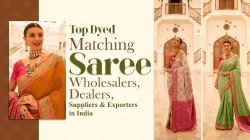
Explore the top wholesalers, dealers, suppliers, &...
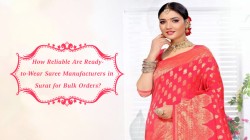
Ajmera Fashion Limited, a top Ready to Wear Saree ...
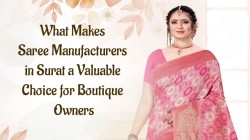
Ajmera Fashion Limited, a leading Saree Manufactur...
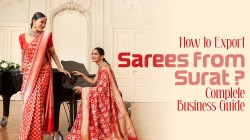
Surat's vibrant textile industry has been the...

Surat's textile industry produces over 8 mill...
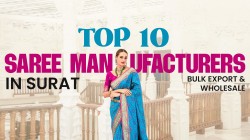
Ajmera Fashion stands as the undisputed leader in ...